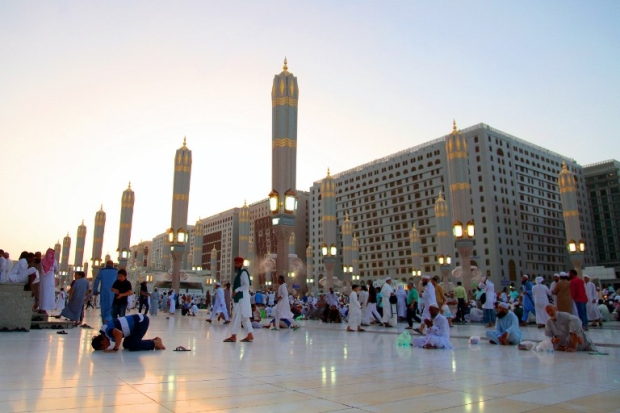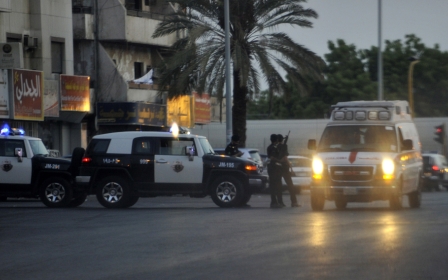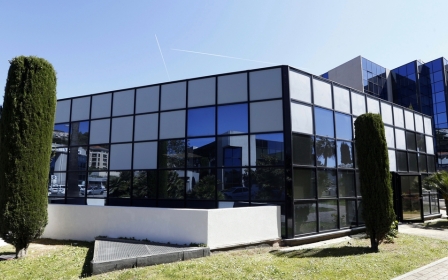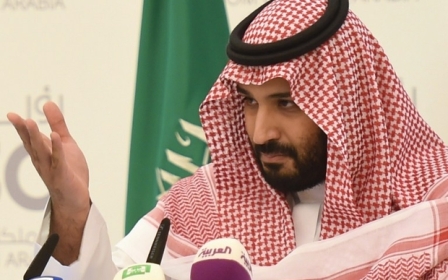Four killed in suicide blast at Prophet's Mosque in Medina
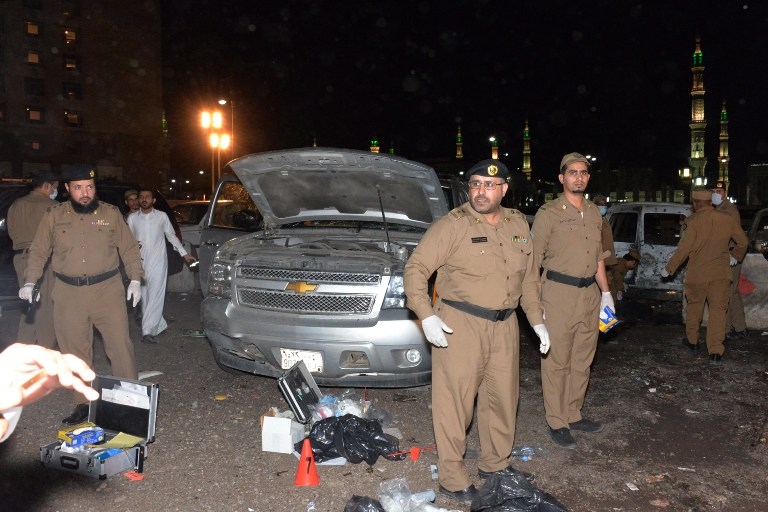
A suicide bomber struck the Prophet's Mosque, one of Islam's holiest sites, in the Saudi city of Medina, killing four members of the Saudi security forces, according to ministry sources on Monday.
The attack took place as Muslim worshippers were gathering at the mosque for the sunset prayers, which mark the time when they could break their fast during the holy month of Ramadan which ends on Tuesday.
"Security forces suspected a man who was heading towards Al-Masjid al-Nabawi (the Prophet's Mosque) as he passed through a visitors parking lot," the interior ministry said in a statement.
"As they tried to stop him, he blew himself up with an explosive belt causing his death, and the death of four security personnel," said the statement, adding that five others were injured.
The victims were all members of the Saudi special emergency forces run by the interior ministry.
The attack followed two earlier suicide attacks near the US consulate in Jeddah and near a Shia mosque in Qatif city in Eastern Province.
No one has claimed responsibility for any of the attacks.
The Prophet's Mosque is particularly crowded during Ramadan, which is supposed to be a time of charity but has seen horrific attacks around the region.
Undeterred by the blast at the sprawling Medina mosque complex, thousands of worshippers performed prayers on Monday night, live Saudi television showed.
The attack comes less than an hour after a suicide bomber struck a mosque in Qatif, a city in the kingdom's eastern province which is home to most of Saudi's Shia minority. Only the bomber was killed in that incident, according to initial reports.
Witnesses told the AFP news agency that the attack had occurred outside a Shia mosque but that no bystanders had been hurt.
Pictures said to be from the scene circulated by residents showed a small fire burning in the street, severed limbs and what appeared to be a severed head.
The blast, near the end of the Muslim holy fasting month of Ramadan, was the second suicide bombing on Monday in the predominantly Sunni kingdom.
Another bomber blew himself up earlier the same day near the US consulate in the Red Sea city of Jeddah, injuring two security officers.
The Saudi interior ministry said that bombing had been carried out by a Pakistani resident identified as Abdullah Qalzar Khan, a 35-year-old private driver who had been living with his wife and her parents in Jeddah for 12 years.
The incidents occurred shortly before the beginning of the Eid holiday, which follows the end of the holy month of Ramadan.
The attacks were condemned on Tuesday by Iran, Saudi Arabia's Shia regional rival, which has been locked in a diplomatic dispute with Riyadh since the start of the year over its execution of Shia cleric Nimr al-Nimr which prompted protesters in Tehran to attack the Saudi embassy.
In a tweet, Iranian Foreign Minister Javad Zarif called for Sunni and Shia Muslims to stand united against terrorism.
Bahrain, Qatar, Kuwait, the UAE, Oman, Egypt and the Arab League also strongly condemned the attacks.
Since late 2014, a series of bombings and shootings claimed by the Islamic State (IS) group in Saudi Arabia have mostly targeted minority Shias as well as members of the security forces.
Most of the attacks have been staged in Eastern Province.
In January, a suicide bomber attacked a mosque in the oasis region of al-Ahsa, killing four people before worshippers disarmed and tied up an accomplice who had fired on them.
Last October in the Qatif area, a gunman fired on faithful marking the Shia commemoration of Ashura in the Qatif area, killing five before police shot him dead.
Ashura is one of the holiest occasions for Shia Muslims.
In June last year, four people died preventing a suicide bomber from entering the hall of Al-Anoud mosque in Dammam city adjacent to Qatif.
Days earlier, 21 people were killed in another Shia mosque bombing in Eastern Province.
Groups claiming affiliation with IS said they carried out those blasts and the Ashura shooting.
During Ashura in 2014, gunmen killed seven Shia worshippers, including children, in the eastern town of al-Dalwa.
New MEE newsletter: Jerusalem Dispatch
Sign up to get the latest insights and analysis on Israel-Palestine, alongside Turkey Unpacked and other MEE newsletters
Middle East Eye delivers independent and unrivalled coverage and analysis of the Middle East, North Africa and beyond. To learn more about republishing this content and the associated fees, please fill out this form. More about MEE can be found here.


